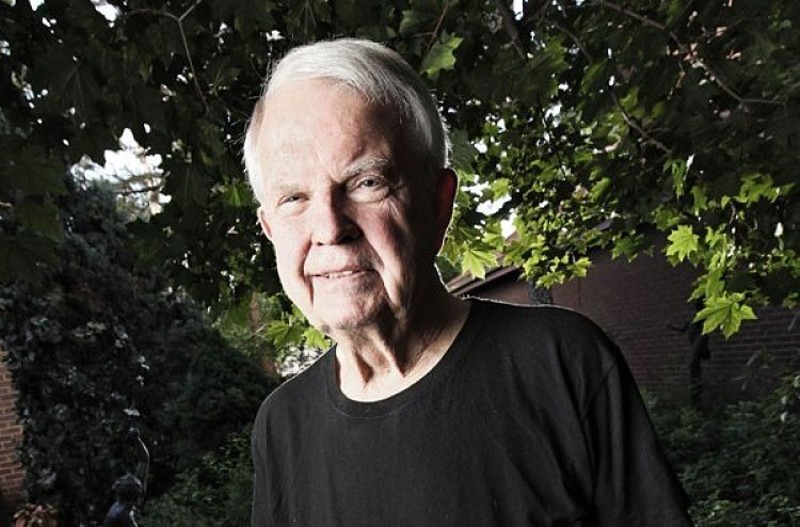Coloradans weren't surprised that Governor Richard Lamm was willing to take on controversial topics.
As a young freshman legislator, a Democrat in a heavily Republican Statehouse, Dick Lamm led the charge to make Colorado the first state in the country to legalize abortion: in cases of rape or incest, when the woman’s physical or mental health was threatened, or if the unborn child might have birth defects. It was 1967.
As a slightly older legislator, Lamm became concerned that taxpayers would be on the hook for the 1976 Winter Olympics, which had been awarded to Denver, and he pushed to get Amendment 8, the Colorado Winter Olympic Games Funding and Tax Amendment, on the November 1972 ballot. Voters worried about the financial burden and potential environmental impact turned out in droves and put a stop to spending any public money on the Olympics.
The Olympics went on to Innsbruck, and Lamm went on to the Colorado governor's office, where he continued to tackle tough topics.
His forthright opinions didn't surprise anyone in Colorado, where he'd already earned the nickname "Governor Gloom," but as he shared them in articles (in Playboy!) and talked about them around the country throughout his three terms, he brought plenty of heat and light (but especially heat) to the public discussion.
Especially when, just shy of fifty, he let loose with this: "We've got a duty to die and get out of the way with all of our machines and artificial hearts and everything else like that and let the other society, our kids, build a reasonable life." He was talking about the fair use of finite resources, but the line brought infinite controversy.
"It is amazing," says the now 84-year-old Lamm. "Some of the big issues of my life, they just don't go away. Abortion, the Olympics, death and dying."
These days, especially death and dying.
His "duty to die" quote was geared specifically to the use of expensive technology for little gain when so many people were going without basic health care. But it has a special resonance today, with debates over how to ration scarce medical supplies, particularly ventilators, in the fight against COVID-19.
"I was never controversial on purpose," Lamm says today. "I have a mind that goes to tough issues."
Even 35 years ago, health care was a tough issue. In 1960, Lamm points out, 6 percent of the nation's spending went to health care, 6 percent to defense, 6 percent to education. Today, health-care's percentage is 19 percent, while education still accounts for just 6...and defense is even lower.
"What I got all hung up on was that I think that age should be a consideration in the delivery of health care, among the valid things you look to," says Lamm, who worked as an accountant and lawyer before he became a politician, and still cites actuarial tables in his arguments. "We have a bigger duty when we ration medicine to a five-year-old than to an 85-year-old."
And rationing was done in this country long before coronavirus hit. "The United States wins the Olympics in rationing; it denies more health care to more people than any other country in the world," Lamm points out. "How do we do that? We do it by leaving 30 million people out of the system."
As a result, "we are the super-deniers," he says.
"I just think that when you really look at it in a macro sense, people have to realize there are a lot of different ways to ration, and we've picked the worst of them."
After he left the governor's office in 1986, Lamm spent considerable time studying health care; in many ways it was a very personal mission after his wife, Dottie, was diagnosed with breast cancer. (One of Lamm's few gubernatorial vetoes was a bill that would have covered autologous bone-marrow transplants for breast cancer patients. "It kills as many people as it saves," he says. "It's rolling the dice with a very expensive procedure. It should not be mandated.")
During a month in England, he researched that country's system, which was basically non-existent until 1948, when the National Health Service was set up after one persistent peer pushed to help the poor. "In English society, they just assume rationing, that service can't do everything for everybody; they want it to be transparent and be fair," Lamm says. "A decent society gets everyone in the tent for health care, even if they have to thin the soup."
In England, that thinner soup resulted in more men wearing trusses than having hernia operations, Lamm recalls. And angina did not necessarily lead to an expensive heart operation.
Lamm's time in England was more than two decades ago, but many of the lessons hold today. "The first thing a sane medical system does is not build a medical Taj Mahal, but provide basic service," he says. He name-checks the CU Anschutz Medical Center, with "all the bells and whistles that Americans love," but which also spends tens of millions on researching obscure diseases "in the middle of a state with 600,000 to 700,000 without health care."
With all the talk of "flattening the curve" these days, Lamm continues to look beyond the curve. "When you start spending money on health care, you get so much benefit," he explains. "But up at the flat of the curve, you don't get much return."
Providing even basic service will be more and more difficult in the days to come, and that will lead to more difficult discussions. "We're going to face incredible things if we follow the course," Lamm says. And that includes determining "who gets a bed and who gets a ventilator."
Who has a duty to die?
"One of the ways you ration, you don't put anyone who has a terminal disease or is already very, very sick in a bed, or on a ventilator," Lamm says. "You have to think about a certain amount of finiteness."
For decades, Lamm was based at the University of Denver, teaching a series of courses called "Hard Choices," and those choices don't get any easier.
So far, Colorado has made some good ones. Lamm says that he thinks Governor Jared Polis, another data-driven politician, has "done exceptionally well" handling the current crisis.
Coloradans would do well to "follow all of the health advice that is coming down, do your social distancing, do your washing of your hands," Lamm says. "But we should also use this whole thing to think about and discuss the various options in health care."
There are other discussions that will come later: how much money big pharma is making, how "the genius of American medicine has outpaced our policy to pay," how Trump has handled (or failed to handle) the crisis.
For now, Lamm says, "I would want people to understand how difficult it is for public-policy makers to think about and do these things. We need compassionate and thoughtful leadership."
And a compassionate and thoughtful citizenship.
"It will be a great learning experience," says the professor/politician. "I do believe that America does the right thing, but it does take a precipitating event."
Which is now.
Lamm points to religions around the world that grapple with death and dying, factoring in age when determining how death is received. For example, his death at 84 (and for the record, he and Dottie "are fine, we're staying home") would be very different from a grandchild's death. It would be the difference between a long life, very well-lived, and a tragic loss.
So who gets the ventilator? The answer is easy.
"It's hard to talk about, hard to talk about rationally," Lamm concludes. "But it just makes sense."
[
{
"name": "Air - MediumRectangle - Inline Content - Mobile Display Size",
"component": "12017618",
"insertPoint": "2",
"requiredCountToDisplay": "2",
"watchElement": ".fdn-content-body",
"astAdList": [
{
"adType": "rectangle",
"displayTargets": "mobile"
}
]
},{
"name": "Editor Picks",
"component": "17242653",
"insertPoint": "4",
"requiredCountToDisplay": "1",
"watchElement": ".fdn-content-body",
"astAdList": [
{
"adType": "rectangle",
"displayTargets": "desktop|tablet"
},{
"adType": "rectangle",
"displayTargets": "desktop|tablet|mobile"
}
]
},{
"name": "Inline Links",
"component": "18838239",
"insertPoint": "8th",
"startingPoint": 8,
"requiredCountToDisplay": "7",
"maxInsertions": 25
},{
"name": "Air - MediumRectangle - Combo - Inline Content",
"component": "17261320",
"insertPoint": "8th",
"startingPoint": 8,
"requiredCountToDisplay": "7",
"maxInsertions": 25,
"watchElement": ".fdn-content-body",
"astAdList": [
{
"adType": "rectangle",
"displayTargets": "desktop|tablet"
},{
"adType": "rectangle",
"displayTargets": "desktop|tablet|mobile"
}
]
},{
"name": "Inline Links",
"component": "18838239",
"insertPoint": "8th",
"startingPoint": 12,
"requiredCountToDisplay": "11",
"maxInsertions": 25
},{
"name": "Air - Leaderboard Tower - Combo - Inline Content",
"component": "17261321",
"insertPoint": "8th",
"startingPoint": 12,
"requiredCountToDisplay": "11",
"maxInsertions": 25,
"watchElement": ".fdn-content-body",
"astAdList": [
{
"adType": "leaderboardInlineContent",
"displayTargets": "desktop|tablet"
},{
"adType": "tower",
"displayTargets": "mobile"
}
]
}
]













